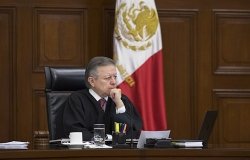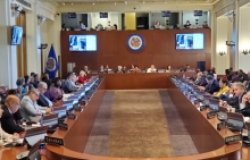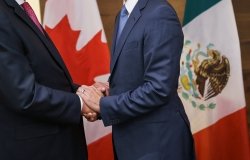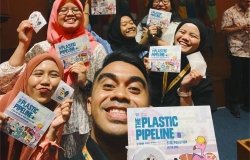Key Question Remains in UN Nuclear Report on Iran
Iran has made progress in clearing up questions about its nuclear work but the jury is still out on alleged activities that could be related to making atomic bombs and putting them on missiles, the UN nuclear watchdog said Friday in an eagerly awaited report.
Iran has made progress in clearing up questions about its nuclear work but the jury is still out on alleged activities that could be related to making atomic bombs and putting them on missiles, the UN nuclear watchdog said Friday in an eagerly-awaited report.
"The one major remaining issue relevant to the nature of Iran's nuclear programme is the alleged studies on the green salt project, high explosives testing and the missile re-entry vehicle," said the report of Mohamed ElBaradei, head of the Vienna-based International Atomic Energy Agency (pictured above, left). He was referring to US allegations about alleged Iranian weapons work, including making uranium metal (green salt project), testing explosives for triggering a chain reaction and putting a nuclear warhead on a missile. ElBaradei's report said the Iranians have dismissed these allegations as "baseless" but a senior IAEA official in Vienna said such an answer "is not enough. It requires some explaining. It requires more in-depth discussion."
A diplomat close to the IAEA said the agency only got the go-ahead to show Iran US intelligence data backing up the allegations on February 3-5 and then some more data on February 15 and "that is why it was too soon for the agency to reach conclusions for this report."
But another diplomat close to the IAEA was more critical, saying the agency was moving slower than it had promised on a "work plan" from last summer to resolve outstanding questions in an IAEA investigation now five years old. The bottom line is that it is still not clear just what is the "scope and nature" of Iran's nuclear program, which the United States suspects aims to produce nuclear weapons but which the Iranians claim is a peaceful effort to generate electricity, the diplomat said.
ElBaradei's report said the Iranians "stated that . . . there had never been a nuclear weapons development programme."
A US National Intelligence Estimate issued last year said however that Iran did have such a weapons programme but halted it in 2003.
ElBaradei's report said Iran had cleared up outstanding questions concerning uranium contamination on certain equipment and Iranian experiments with polonium and beryllium, which can be used in nuclear weapons. ElBaradei said in comments distributed to the press: "In the last four months, in particular, we have made quite good progress in clarifying the outstanding issues that had to do with Iran's past nuclear activities, with the exception of one issue, and that is the alleged weaponization studies that supposedly Iran has conducted in the past."
ElBaradei also reported that Iran continues to enrich uranium, and even to work on improved centrifuges which can more quickly manufacture enriched uranium, a strategic substance which can be either nuclear reactor fuel or atom bomb material. This enrichment work is in defiance of UN Security Council resolutions calling on Iran to stop this sensitive activity. US ambassador to the IAEA Gregory Schulte said in a statement that Iran's work on advanced centrifuges is "deepening its violation of international obligations and broadening its defiance of the international concerns."
The opinions expressed here are solely those of the author and in no way represent the views or opinions of the Woodrow Wilson International Center for Scholars.










